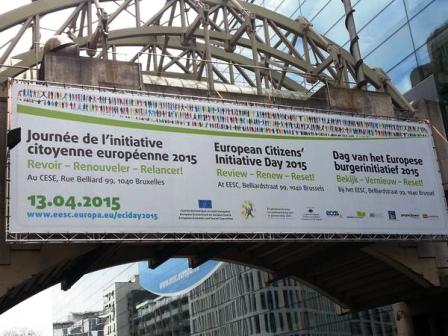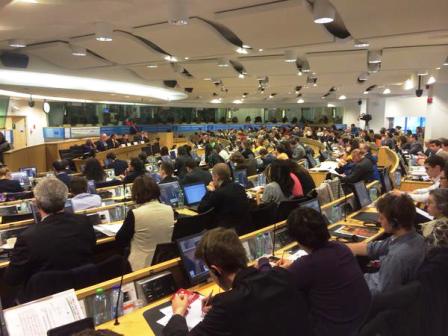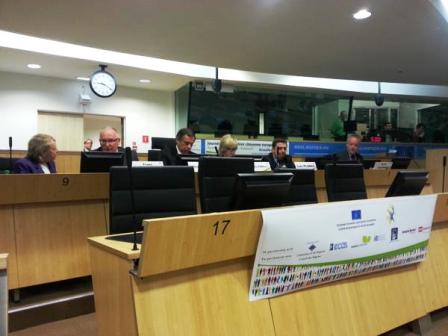The European Economic and Social Committee (EESC) organized an event on the theme of the European Citizens’ Initiative Day 2015, which focused on: a) the reports from the European Commission (an assessment report on the first three years of ECI practice) and the European Ombudsman (in 2014, the European Ombudsman carried out an own-initiative inquiry in order to receive feedback on how effectively the ECI procedure was working) on the ECI procedure, b) ECI renewal and resetting and c) the different perspectives: users, Member States, Parliament and support structures.
Introduced by the Treaty of Lisbon, the European Citizens’ Initiative (ECI) is the most important instrument for direct democracy at European level. Three years after its launch, the time has come for an assessment and potential reset of the ECI legal framework, particularly Regulation 211/2011.

In his introductory remarks EESC President Malosse menionted that ECI is the driving force that can enable European construction to take off again and asked the European Commission to involve the EESC for an opinion on the ECIs collecting more than 1million signatures. For President Malosse the ECI is not a gadget. He supported the general purpose of the ECI and its digitalization, but according to Mr. Malosse there are still some technical elements and issues that should be arranged in order to improve ECI and take it one step further. In that respect he put EESC services at ECI’s disposal to translate them into the 23 official EU languages, by claiming that ECI is essential to overcome the gap between citizens and EU institutions, and demanded the entire article 11 progress considering that the EU is founded on fundamental democratic principles and subsequently, no one has the right to block up the European citizens’ voice. He gave the floor to First Vice President of the European Commission by expressing his support to the new formula and type of Juncker’s Commission.
Frans Timmermans, First Vice-President of the European Commission, presented the European Commission assessment report on the first three years of ECI practice. The fact that two Citizens’ Initiatives have gone through the full process shows that the Regulation establishing the ECI has been fully implemented. However, the report acknowledges that there is still room to improve the process and identifies a number of possible issues for further discussion with stakeholders and institutions. Under the rules set out in the Lisbon Treaty, if a Citizens’ Initiative collects over one million statements of support (signatures), in an area where the European Commission has competence to propose law, then the Commission must formally discuss the issue and publish a response in the form of a Commission Communication.
The Report shows that, in the past three years, 51 requests to launch an initiative have been received. From these 51 requests, 31 were in fields of Commission competence and have been registered; 3 have so far reached the threshold of one million signatures; 12 reached the end of their collection period without reaching the threshold; 3 are still collecting statements of support; and 10 were withdrawn by the organizers. First Vice-President stressed out that “The ECI is one of the building blocks for strengthening trust in the European institutions, for promoting active participation of citizens in EU policy-making and to reconnect people with EU institutions. We must look for innovative ways to encourage greater and more effective use of the tool. This is an important instrument, and we must make sure it lives up to its full potential.”
Indicatively he referred to the ECI by saying that ECI was created for citizens and should be recognized by citizens as belonging to them, although he admitted that he cannot yet be fully satisfied and he knows that there are some difficulties for organizers to collect statements of support. First Vice-President Timmermans underlined the political aspect and form of ECI and recalled that during his EP hearing he had pledged to engage in political dialogue and he still remains committed to that. Commission acts within the framework of the Treaty on ECIs – ECI was not meant to bring about Treaty changes- , but there can still be a political debate without a formal response. He concluded that he would listen carefully to ideas and proposals to improve the European Citizens Initiative.
The European Ombudsman, Emily O’Reilly, presented the conclusions of her own-initiative inquiry, carried out in 2014 in order to receive feedback on how effectively the ECI procedure was working. After receiving a number of complaints, the Ombudsman decided to investigate the proper functioning of the ECI procedure and the Commission’s role and responsibility in this regard. The Ombudsman invited organisers of ECIs, civil society organisations, and other interested persons to provide input on how well the ECI is working. On the basis of these responses, the Ombudsman made a range of suggestions to the Commission to increase the effectiveness of the ECI process. Her inquiry had two objectives. The first was to ensure that the current ECI Regulation is applied correctly and in as citizen-friendly way possible. The second was to provide input to the review of the ECI Regulation. In closing the inquiry, the Ombudsman welcomes the Commission’s response to date and offers 11 guidelines for further improvement. The Commission should indicate how and when it will implement each measure that has been suggested. It would be helpful if the Commission could follow-up by 31 May 2015.
Ombudsman O’Reilly began her contribution by saying that her mission as European Ombudsman is to work with the EU institutions to create a more effective, accountable, transparent and ethical administration and thus, the ECI inquiry is a good example of this. The institution of the European Ombudsman took an early interest in the ECI and the ECI Regulation. They did so with a view to promoting European citizenship, but also in the context of the Ombudsman’s key role in promoting good administration. They were therefore keen that the ECI procedure should be as transparent and citizen-friendly as possible. She referred to one of her letters to the Commission during her inquiry, where she wrote that she wished to help it to engage fully with the ECIs, so that citizens feel not only that they have a voice, but also that they have been listened to and taken seriously.
She pointed out that the Commission should explain the political reasons for accepting/rejecting an ECI. She added that EU needs more political champions for ECIs at member states level because there are limits to what the Commission can do. Additionally, she emphasized the need of better software for collecting signatures and uniform requirements across MS for further improvement.
Finally, she commented that she would certainly stay involved in the debate on this important tool for European citizenship and she would report on the follow-up to the guidelines that she had made to the Commission and continued that she would remain available to be of assistance both to citizens and to the Commission in dealing with individual complaints on issues related to the application of the ECI Regulation where she saw a room for improvement from a good administrative perspective.


